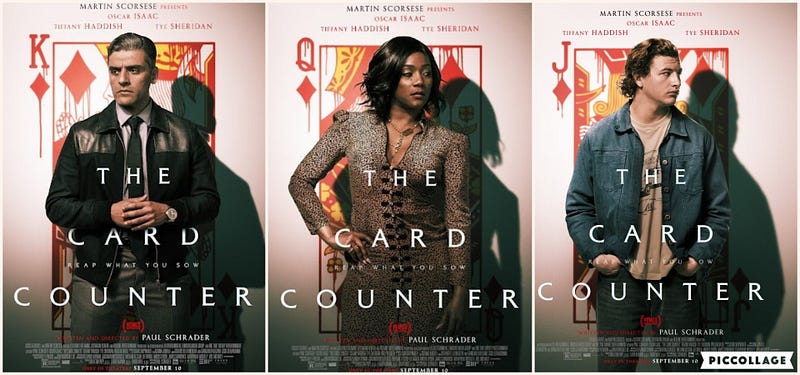“The Card Counter” by Paul Schrader
and why did a film covering so many of my passions leave me so cold?
and why did a film covering so many of my passions leave me so cold?
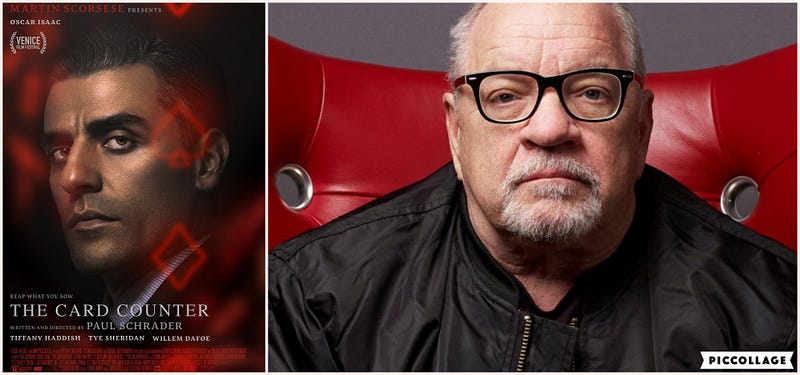
When insomnia unexpectedly struck early this morning I treated myself to a strong batch of English tea, a warming duvet and the luxury of a little gadget connected to my television and the witchcraft and wizardry of The Matrix internet. Without a single second of previews, reviews or cinema gossip of any description, I immediately settled on The Card Counter based on my fascination for the director Paul Schrader (his cinematic history is legendary: screenplay writer of Taxi Driver, Raging Bull and Last Temptation of Christ amongst many, many more), and I particularly adored his 2017 film First Reformed. For the above fascination for Paul Schrader, that can be trumped (card pun intended) for my adoration of the cinematic masterpieces created by Martin Scorsese who directed the screenplay words of Schrader on all three of those monumental films noted above as well as Mean Streets, Goodfellas, Casino and Cape Fear all before the turn of the Millennium.
Scorsese acts as Executive Producer here and in a tale that immediately intrigued me, as it quickly unravelled and it was clearly apparent that this gritty story was about far more than the mathematical and methodical act of cheating that constitutes the titular “card counter” and act of counting cards in a game of Blackjack at a casino. I can’t count cards but I can appreciate a good game of cards, be it Blackjack or Poker but far more importantly I can also appreciate (and adore) a twisted dramatic tale of disaffection, dislocation, the real heart of humanity to help, cajole and guide a fellow traveller on life’s path. Or the masks we all wear in certain societal circumstances or indeed a personal mask against the deeper chasms of personal despair, memories or pure existential angst. Or starting over. Starting again. Turning the page.
Flipping the playing card of life.
Being assured within one’s own skin and not going on “tilt” and also accepting the possibility of love and affection in such a scarred existence that you’re trying desperately and constantly to keep under a calm control.
All of these human conditions appeal to me in a dramatic film and this film has all of those characteristics in spades (lazy pun again intended). With a through line of the abhorrent atrocities our Governments sanctioned in horrific hellholes such as the Abu Ghraib prison and the scandalous use of “enhanced interrogation” (which when you spin through an Orwellian translator comes out as a more simple “torture”) and an essentially four handed acting take on all of these snapshot cinematic headlines, why did this film leave me so cold and annoyed I didn’t love it more?
Perhaps the four brief appraisals of our headline roles will give you a spoiler free flavour of why:
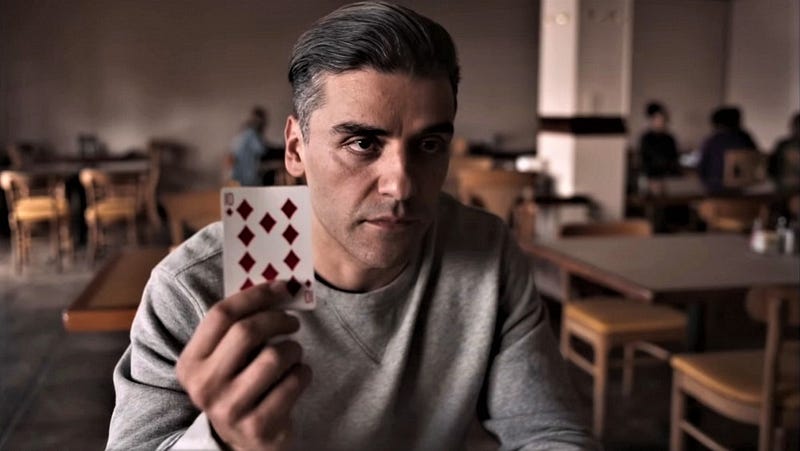
“William Tillich” (Oscar Isaac). Also known as “William Tell” or “Tell” or “Till”, Isaac portrays a simmering shellshock (rather than the Orwellian “Post Traumatic Stress Disorder) brilliantly as his outwardly calm, calculating and controlled exterior masks much deeper psychological war wounds. A counter of cards and a watcher of people, he keeps a possible “tilt” in check through his meticulous nature, honed routines and the widening cracks in his humanity as he mentors “The Kid” and opens himself to wider opportunities with a “Stable Manager” in the high stakes world of Poker. Where Isaac excels in his somewhat monotone and all consuming calmly detached role and approach is beautifully typified in the overall nature of a calm, calculated and meticulous man in complete order and control. The performance is eerily reminiscent of Billy Bob Thornton’s detached killer role in the first season of Fargo. Isaac’s character name may deviate but the longer the film continues, the more you see and feel his “tell” or his giveaway, his failing, his inner desire, maybe more than an inner sadness too, and in a role he nearly, nearly convinces with.
Isaac shot to prominence in the reimagined Star Wars saga but I adore him in the Coen Brothers Inside Llewyn Davis and his similarly detached role of “Nathan” in the wonderous Ex Machina. There are just 3 or 4 of those “tells” in this film where Isaac looks for a split second at an end to a scene or a cutaway as though he’s a little flummoxed at what’s happening around him. Maybe a few seconds of editing would’ve eradicated these as they made an impression on me, or maybe it’s just me! I love the acting prowess of Oscar Isaac. I just thought there were 3/4 fleeting pieces of the jigsaw missing here.
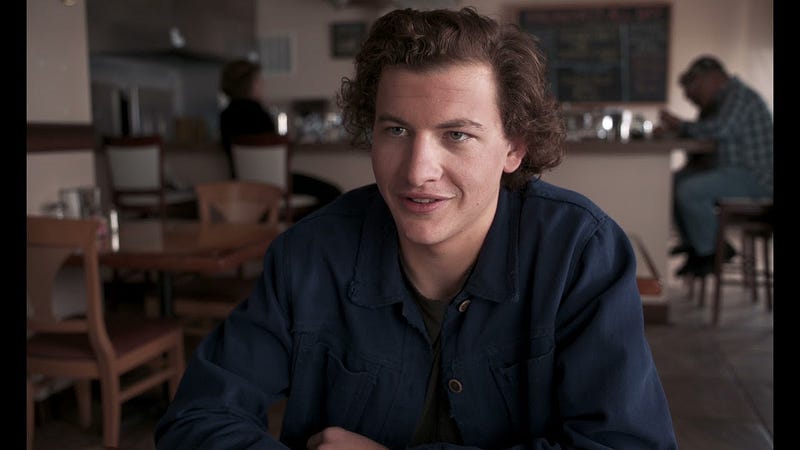
“Cirk” (Tye Sheridan). Also known affectionately as “The Kid” by William Tillich above, Cirk is anything but the smiling kid in the picture above as he’s tortured by desires of revenge that are way out of his youthlike reach and slowly mentored and brought under the more calming wing of William as simply company on long monotonous card playing road trips. They are brought together by happenstance and perhaps a happy coincidence and both of their lives are the better for it. Sheridan embodies youthful angst and bitterness really well in his mannerisms and tics and as a huge fan of Ready Player One it’s pleasing to see him return here on such good form.
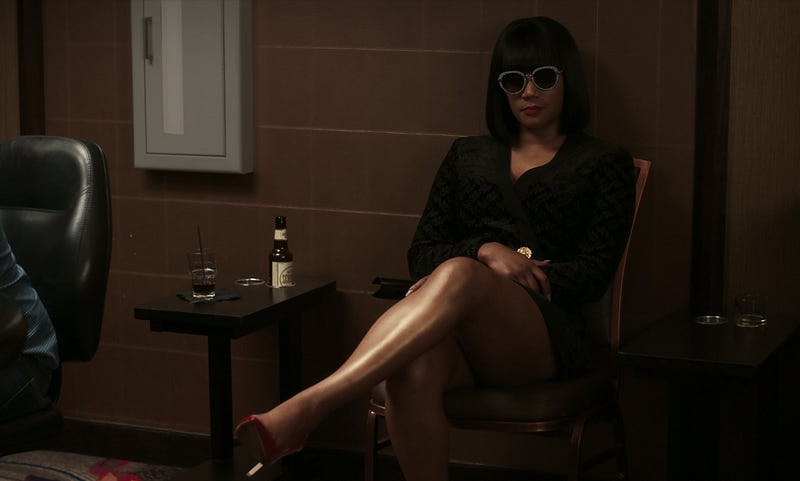
“La Linda” (Tiffany Haddish). I know Tiffany Haddish as ostensibly a very funny American comedienne and this was my first opportunity to see her in a cinematic role and much like her co-star Oscar Isaac above, I felt there were 3/4 occasions when tighter editing or cutaways from Haddish would’ve served her and the film a lot more. However, and it’s a big however, her smiles and laughs radiate the film as a somewhat gainfully employed stable manager of poker players and the front for the big money supplied from the shadows to the players in her “stable”. The true heart of the film.
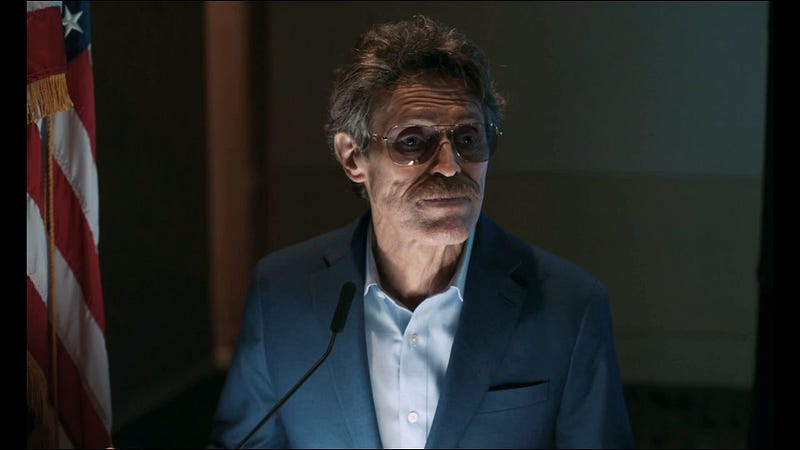
“Major John Gordo” (Willem Dafoe). As brilliantly depicted in the picture above, we first see Dafoe as a presenter at an Expo Conference and deliberately (and brilliantly) bathed in masking shadows for a character that although only a cameo from the four main leads, a cameo wrought with such shadows, and contradictions and far more below the surface of Dafoe’s brilliant portrayal.
The highlights of this film for me were the instances as noted above as well as a brilliantly lit sequence as William and La Linda stroll through late night Casino gardens full of light and vibrancy and the sped up surreal late night driving sequences. There are also surreal “fish eye” type sequences in flash back as we’re bombarded with flashes of graphic prison torture and the unspeakable acts vividly displayed (both cinematically and from stock footage of the day) of smiling Americans such as Dick Cheney who ordered and approved of such techniques. There are lengthy smatterings of such real life stock footage and it’s both sobering to think these atrocious acts happened this Century and we have the televisual evidence to both prove it and vow naively that this should never happen again. Director Schrader deserves a lot of credit for the realisation of these sequences, as do his cinematographer Alexander Dynan. Some tighter editing may have improved and rounded off the edges of some performances and scenes but although the film’s denouement was touchingly reminiscent of 2011’s brilliant and cruelly overlooked Paddy Considine directorial debut Tyrannosaur, I was left a little cold and underwhelmed from the entire film. The poker scenes in particular were incredibly flat and staged and no tension in these crucial scenes at all. The mentorship between older and younger man never passed a crucial line for me and while other relationships do, I just felt the overall film was just a little “flat” all round. Maybe it was my early morning insomnia speaking, but after ruminating on this for a few hours, my reactional feelings remain the same.
And that’s a shame as there was so much promise here.
